外研版2019选择性必修第一册Unit 1 Laugh out loud Period 2 Using language-课件(共24张)
文档属性
| 名称 | 外研版2019选择性必修第一册Unit 1 Laugh out loud Period 2 Using language-课件(共24张) |

|
|
| 格式 | zip | ||
| 文件大小 | 27.7MB | ||
| 资源类型 | 教案 | ||
| 版本资源 | 外研版(2019) | ||
| 科目 | 英语 | ||
| 更新时间 | 2022-08-26 18:35:52 | ||
图片预览


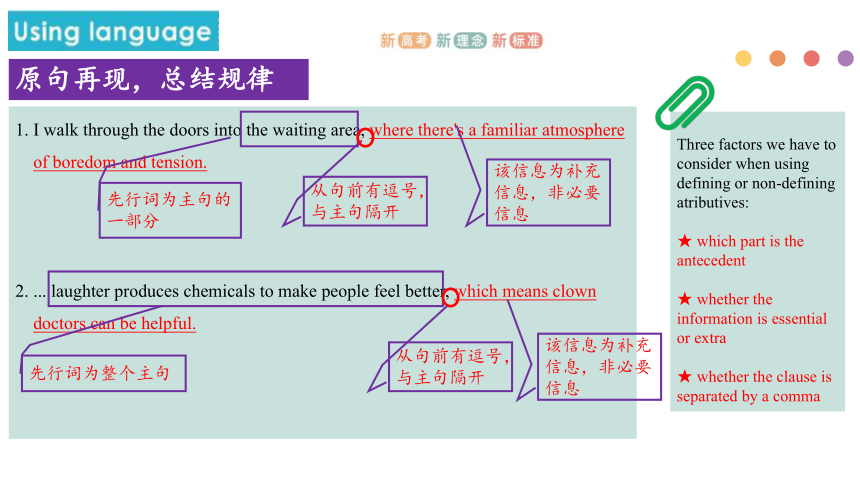
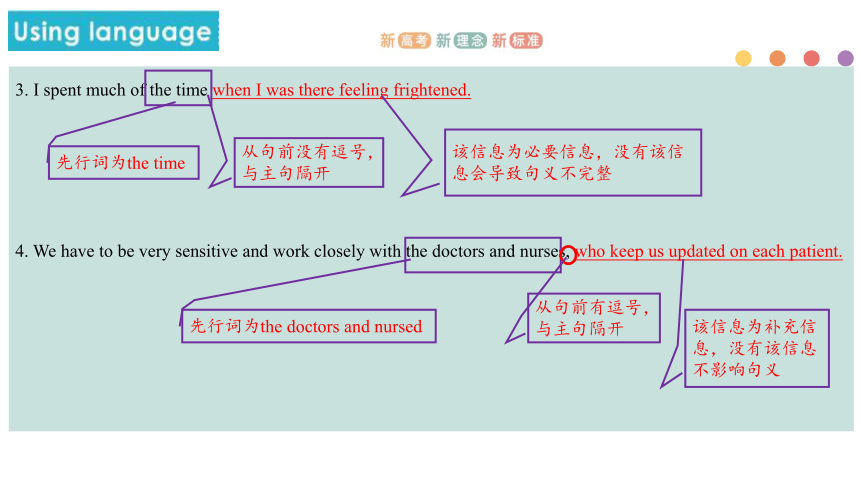
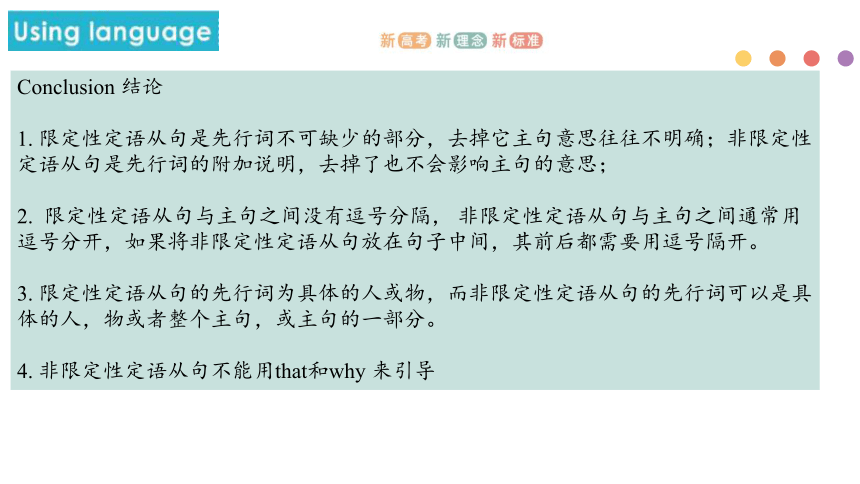

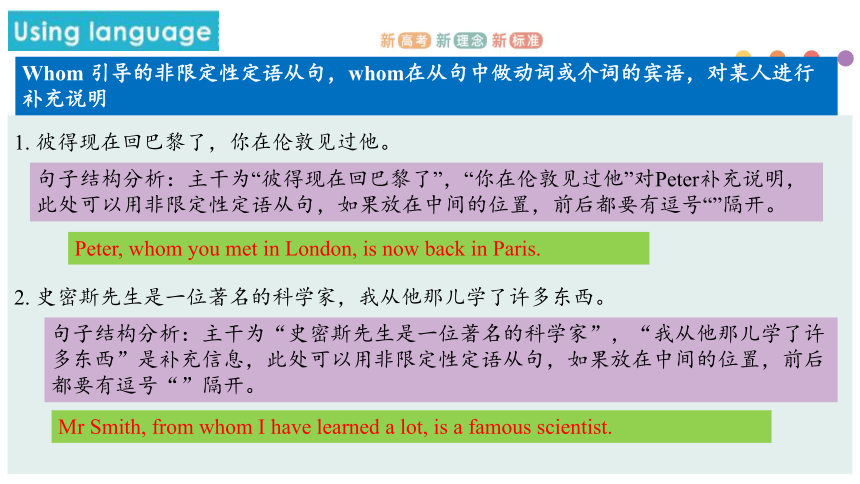
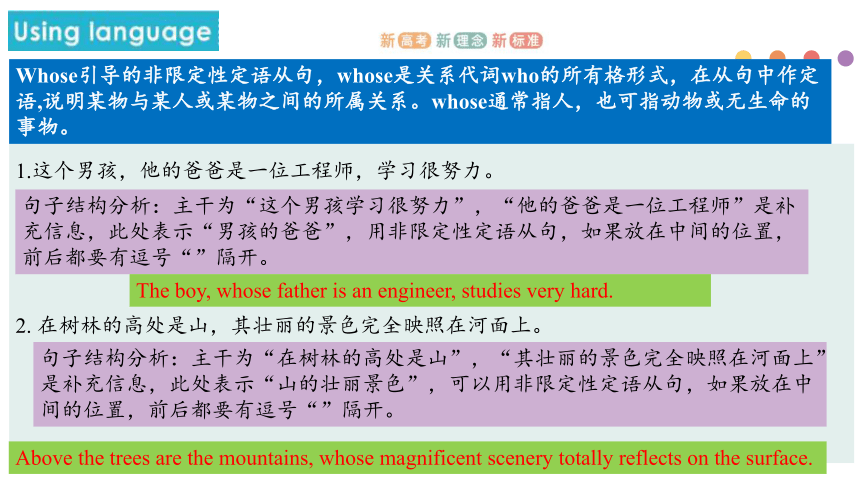
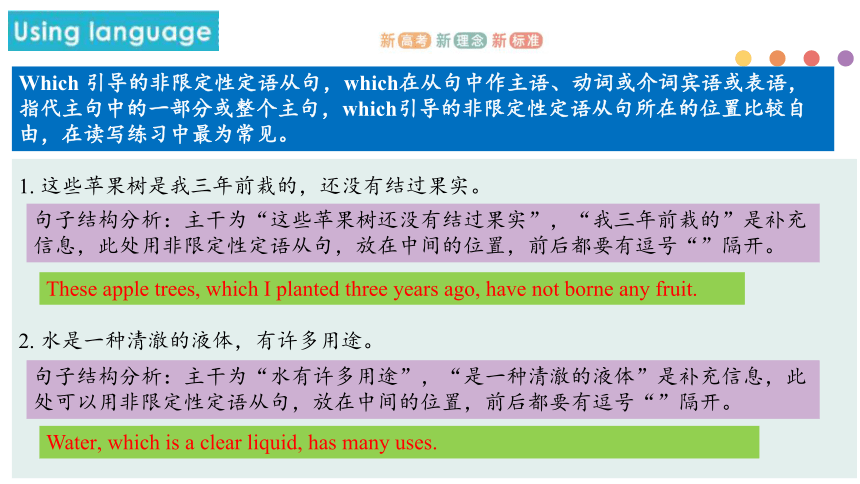
文档简介
(共24张PPT)
Unit 1 Laugh Out Loud!
Period 2 Using language
Non-defining attributive clauses
1. The analysis of non-defining attributive clause
2. Exercises of relatives in non-defining attributive clause
3. Translation exercises concerning attributive clauses
1. I walk through the doors into the waiting area, where there's a familiar atmosphere
of boredom and tension.
2. ... laughter produces chemicals to make people feel better, which means clown
doctors can be helpful.
原句再现,总结规律
Three factors we have to consider when using defining or non-defining atributives:
★ which part is the antecedent
★ whether the information is essential or extra
★ whether the clause is separated by a comma
从句前有逗号,与主句隔开
先行词为主句的一部分
该信息为补充信息,非必要信息
先行词为整个主句
从句前有逗号,与主句隔开
该信息为补充信息,非必要信息
3. I spent much of the time when I was there feeling frightened.
4. We have to be very sensitive and work closely with the doctors and nurses, who keep us updated on each patient.
先行词为the time
从句前没有逗号,与主句隔开
该信息为必要信息,没有该信息会导致句义不完整
先行词为the doctors and nursed
从句前有逗号,与主句隔开
该信息为补充信息,没有该信息不影响句义
Conclusion 结论
1. 限定性定语从句是先行词不可缺少的部分,去掉它主句意思往往不明确;非限定性定语从句是先行词的附加说明,去掉了也不会影响主句的意思;
2. 限定性定语从句与主句之间没有逗号分隔, 非限定性定语从句与主句之间通常用逗号分开,如果将非限定性定语从句放在句子中间,其前后都需要用逗号隔开。
3. 限定性定语从句的先行词为具体的人或物,而非限定性定语从句的先行词可以是具体的人,物或者整个主句,或主句的一部分。
4. 非限定性定语从句不能用that和why 来引导
1. 我们的向导,一个法裔加拿大人,是一位优秀的厨师。
2. 我家的园丁非常悲观,他说今年将不结苹果。
Who 引导的非限定性定语从句,who在从句中做主语,对某人进行补充说明
句子结构分析:主干为“我们的向导是一位优秀的厨师”,“一个法裔加拿大人”是补充信息,此处用非限定性定语从句,放在中间的位置,前后都要有逗号“”隔开。
Our guide, who was a French Canadian, was an excellent cook.
句子结构分析:主干为“我家的园丁说今年将不结苹果”,“非常悲观”是补充信息,此处可以用非限定性定语从句,放在中间的位置,前后都要有逗号“”隔开。
My gardener, who is very pessimistic, says that there will be no apples this year.
1. 彼得现在回巴黎了,你在伦敦见过他。
2. 史密斯先生是一位著名的科学家,我从他那儿学了许多东西。
Whom 引导的非限定性定语从句,whom在从句中做动词或介词的宾语,对某人进行补充说明
句子结构分析:主干为“彼得现在回巴黎了”,“你在伦敦见过他”对Peter补充说明,此处可以用非限定性定语从句,如果放在中间的位置,前后都要有逗号“”隔开。
Peter, whom you met in London, is now back in Paris.
句子结构分析:主干为“史密斯先生是一位著名的科学家”,“我从他那儿学了许多东西”是补充信息,此处可以用非限定性定语从句,如果放在中间的位置,前后都要有逗号“”隔开。
Mr Smith, from whom I have learned a lot, is a famous scientist.
1.这个男孩,他的爸爸是一位工程师,学习很努力。
2. 在树林的高处是山,其壮丽的景色完全映照在河面上。
Whose引导的非限定性定语从句,whose是关系代词who的所有格形式,在从句中作定语,说明某物与某人或某物之间的所属关系。whose通常指人,也可指动物或无生命的事物。
句子结构分析:主干为“这个男孩学习很努力”,“他的爸爸是一位工程师”是补充信息,此处表示“男孩的爸爸”,用非限定性定语从句,如果放在中间的位置,前后都要有逗号“”隔开。
The boy, whose father is an engineer, studies very hard.
句子结构分析:主干为“在树林的高处是山”,“其壮丽的景色完全映照在河面上”是补充信息,此处表示“山的壮丽景色”,可以用非限定性定语从句,如果放在中间的位置,前后都要有逗号“”隔开。
Above the trees are the mountains, whose magnificent scenery totally reflects on the surface.
1. 这些苹果树是我三年前栽的,还没有结过果实。
2. 水是一种清澈的液体,有许多用途。
Which 引导的非限定性定语从句,which在从句中作主语、动词或介词宾语或表语,指代主句中的一部分或整个主句,which引导的非限定性定语从句所在的位置比较自由,在读写练习中最为常见。
句子结构分析:主干为“这些苹果树还没有结过果实”,“我三年前栽的”是补充信息,此处用非限定性定语从句,放在中间的位置,前后都要有逗号“”隔开。
These apple trees, which I planted three years ago, have not borne any fruit.
句子结构分析:主干为“水有许多用途”,“是一种清澈的液体”是补充信息,此处可以用非限定性定语从句,放在中间的位置,前后都要有逗号“”隔开。
Water, which is a clear liquid, has many uses.
1. 在那么多人面前他有点紧张,这是可以理解的。
2.他可能得了急性盲肠炎,如果是这样,他就得动手术。
Which 引导的非限定性定语从句,最经常使用的方法是对整个主句进行补充说明,比如:主句阐述一件事,后面使用非限定性定语从句阐述这件事可能产生的后果等。
句子结构分析:主干为“在那么多人面前他有点紧张”,“这是可以理解的”是补充信息,前面说的那种情况是可以理解的,此处要用非限定性定语从句。
In the presence of so many people he was little nervous, which was understandable.
句子结构分析:主干为“他可能得了急性盲肠炎”,“如果是这样,他就得动手术”是补充信息,表示如果发生了前面所说的情况,就会出现某种后果。此处可以用非限定性定语从句来表达。
He may have acute appendicitis, in which case he will have to be operated on.
1. 正如美国人都知道的,马克·吐温是一位伟大的美国作家。
as引导非限定性定语从句时,代替整个主句,对主句进行补充说明,通常用于
as we all know,正如我们都知道的
as is known to all 正如我们都知道的
as is said above 正如上面所说的
as is always mentioned above正如上面提到的
as is often the case 这是经常发生的
as is reported in the newspaper正如报纸上报道的,等句式中。as在非限定性定语从句中作主语、宾语,且引出的从句位置比较灵活,常位于句首,也可置于主句中间。通常由逗号将其与主句隔开。as有“正如……, 就像……”之意。
句子结构分析:主干为“马克·吐温是一位伟大的美国作家”,“正如美国人都知道”是补充信息,对主句进一步补充说明,此处可以用非限定性定语从句,常放在句首。
As is known to the United States, Mark Twain is a great American writer.
1. 重庆是一座与我们在其他地方就看到的不一样的城市。
2. 史密斯先生并非是我们认为的那种人。
此外as还用在固定结构中,the same … as , such… as,先行词被the same或者such修饰,在定语从句中作主语或宾语,这时词为as
句子结构分析:主干为“史密斯先生并非是那种人”,“我们认为的”是补充信息,此处为限定性定语从句,现行词为such a person,关系词在定语从句中作宾语,关系词为as。
Chongqing is not the same city as we have seen in other places.
句子结构分析:主干为“重庆是一座城市”,“与我们在其他地方就看到的不一样的”是必要信息,此处为限定性定语从句,现行词为the same city,关系词在定语从句中作宾语,关系词为as
Mr. Smith is not such a person as we considered.
1. 他将把郊游推迟到5月1号,那时他将有空。
When引导的非限定性定语从句,when在从句中做时间状语,指代主句中表示时间的词语
句子结构分析:主干为“他将把郊游推迟到5月1号”,“那时他将有空”是补充信息,此处用非限定性定语从句,关系词在定语从句中作时间状语,从句表示“他将在5月1日时有空”,关系词指代主句中的时间。
He will put off the picnic until May 1st, when he will be free.
他们去了伦敦,在那儿呆了六个月的时间。
Where引导的非限定性定语从句,where在从句中做地点状语,指代主句中表示地点的词语
句子结构分析:主干为“他们去了伦敦”,“在那儿呆了六个月的时间”是补充信息,此处用非限定性定语从句,关系词在定语从句中作地点状语,定语从句表示“他们在伦敦呆了六个月”,关系词指代主句中的地点。
They went to London, where they stayed for six months.
1. She heard a terrible noise, _________frightened her.
2. She heard a terrible noise ____________ frightened her.
3. I had told them the reason, _________ I didn't attend the meeting.
4. I had told them the reason _____________ I didn't attend the meeting.
5. He was eager to go to the hospital to see his stepmother,_________ he loved and respected
as his own mother.
6. He was eager to go to the hospital to see his stepmother________________ he loved and
respected as his own mother.
7. Do you know Tom ________________ we talked about
8. Do you know Tom, _________ we talked about
which
which/that
for which
why/for which
whom
who/whom/不填
who/whom/不填
whom
9. The American journalist, _________ the announcer mentioned in the news broadcast, is said
to have been killed by the gangsters.
10. The American journalist _________________ the announcer mentioned in the news
broadcast is said to have been killed by the gangsters.
11. He bought the car for more than $20,000, ____________ his father was angry.
12. _________ is reported in the newspaper, some artistic treasure will be on show at the exhibition on the weekend.
13. The sun heats the earth , _________ makes it possible for plants to grow .
whom
with which
who/whom/不填
As
which
注意:限定性定语从句和非限定向定语从句即使表达完全相同的句义,关系词的使用也会不同。
14._____ is reported on TV that 6,000 people died accidentally in Lebanon due to a sudden explosion.
15. Lincoln asked the people to think of slavery in the way _______________ these men did.
16. The clever boy made a hole in the wall, through _________ he could see what was going
on inside house.
17. We warmly welcomedthe foreign guests at the airport, most of _________ were scientists
18. It's helpful to put children in a situation _________ they can see themselves differently.
19. China will hold a national mourning Saturday for martyrs ____________ died in the fight
against the COVID-19.
20. For the young people __________want to go abroad to study our school is a good choice.
As
in which/ that/不填
which
whom
where
who/that
who/that
1. 现在它拥有两万公顷土地,其中三分之二之多已经耕种。
It now has 20,000 hectares of land, more than _______________________________ .
2. 光是世界上最快的东西,它的速度是每秒30万千米。
Light is the fast thing in the world, _____________________________________________.
3. 大厅里有三十把椅子,绝大部分是新的。
There are 30 chairs in the small hall, _______________________.
使用限定性定语从句或非限定性定语从句把句子补充完整
two-thirds of which are cultivated
the speed of which is 300, 000 kilometer per second
most of which are new
4. 他忘了带笔,这是常事。(as在从句中作主语)
He forgot to bring his pen with him, _____________________.
5. 众所周知,地球是圆的。(as在从句中作宾语)
_____________________________, the earth is round.
6. 你知道,台湾是中国不可分割的一部分。(as在从句中作宾语)
Taiwan is, _______________, an inseparable part of China.
练习使用as
as was often the case
As we all know/As is known to all
as you know
1. 我上个月买的房子带着个漂亮的花园。
The house, _________________________, has a lovely garden.
2. 这本我已经读过三遍的小说很感人。
This novel, _________________________, is very touching.
3. 他似乎没理解我的意思,这使我心烦。
He seems not to have grasped what I meant, ______________________.
4. 液态水变为蒸汽,这就叫做蒸发。
Liquid water changes into vapor, __________________________.
which I bought last month
which I have read three times
which greatly upsets me
which is called evaporation
1. 正像我们所预料的那样,这个男孩取得了大的进步。
The boy has as much progress ___________________.
2. 每个人都知道,中国是一个有着悠久历史的美丽国家。
___________________,China is a beautiful country with a long history .
3. 我从未听说过他讲得那种事。
I have never heard such a story ____________.
4. 这本书与我上周丢失的书不一样。
This is the same book _______________.
as we had expected
As everyone knows
as he told
as I lost last week
Read the passage and rewrite the tips using non-defining attributive clauses. Add more tips to the list if you can.
SECRETS to HAPPINESS
Achieving a positive state of mind isn't easy for everyone. But there are ways to maintain a healthy mind even during times of difficulty.
● Go for a walk in the countryside. There you can enjoy the beautiful views and a peaceful atmosphere.
● Spend time with your family and friends. This will activate chemicals in your brain to make you feel happier.
● Try to accept your mistakes. You can learn a lot through them.
● Close your eyes and picture the future. You've made your dreams come true.
Go for a walk in the countryside, where you can enjoy the beautiful views and a peaceful atmosphere.
Spend time with your family and friends, which will activate chemicals in your brain to make you feel happier.
Try to accept your mistakes, from which you can learn a lot.
Close your eyes and picture the future, wehn you've made your dreams come true.
Complete the joke with the sentence parts in the box using who/which and put commas in the correct position.
One day, Sherlock Holmes and Dr Watson go camping. They put up their tent under the stars and go to sleep. Suddenly, in the middle of the night, Watson is woken up by Holmes 1._________________________. "Watson,"Holmes says, "look up at the stars, and tell me what they tell you." Not quite sure what he means,Watson thinks Holmes is joking 2.________________________ at this time of night. Even so, he replies, "I see millions of stars and it's quite likely there are some planets like Earth. And if so, this means that there might also be life on other planets." Watson is pleased with his answer 3. ________________________________. But Holmes 4._______________________________shouts, "Watson, look around you! Use your eyes! Somebody's stolen our tent!"
has lost his patience by now
he thinks will impress Holmes
is lying next to him
he finds annoying
, who is lying next to him
,who has lost his patience by now,
, which he thinks will impress Holmes
, which he finds annoying
感谢您的观看
Unit 1 Laugh Out Loud!
Period 2 Using language
Non-defining attributive clauses
1. The analysis of non-defining attributive clause
2. Exercises of relatives in non-defining attributive clause
3. Translation exercises concerning attributive clauses
1. I walk through the doors into the waiting area, where there's a familiar atmosphere
of boredom and tension.
2. ... laughter produces chemicals to make people feel better, which means clown
doctors can be helpful.
原句再现,总结规律
Three factors we have to consider when using defining or non-defining atributives:
★ which part is the antecedent
★ whether the information is essential or extra
★ whether the clause is separated by a comma
从句前有逗号,与主句隔开
先行词为主句的一部分
该信息为补充信息,非必要信息
先行词为整个主句
从句前有逗号,与主句隔开
该信息为补充信息,非必要信息
3. I spent much of the time when I was there feeling frightened.
4. We have to be very sensitive and work closely with the doctors and nurses, who keep us updated on each patient.
先行词为the time
从句前没有逗号,与主句隔开
该信息为必要信息,没有该信息会导致句义不完整
先行词为the doctors and nursed
从句前有逗号,与主句隔开
该信息为补充信息,没有该信息不影响句义
Conclusion 结论
1. 限定性定语从句是先行词不可缺少的部分,去掉它主句意思往往不明确;非限定性定语从句是先行词的附加说明,去掉了也不会影响主句的意思;
2. 限定性定语从句与主句之间没有逗号分隔, 非限定性定语从句与主句之间通常用逗号分开,如果将非限定性定语从句放在句子中间,其前后都需要用逗号隔开。
3. 限定性定语从句的先行词为具体的人或物,而非限定性定语从句的先行词可以是具体的人,物或者整个主句,或主句的一部分。
4. 非限定性定语从句不能用that和why 来引导
1. 我们的向导,一个法裔加拿大人,是一位优秀的厨师。
2. 我家的园丁非常悲观,他说今年将不结苹果。
Who 引导的非限定性定语从句,who在从句中做主语,对某人进行补充说明
句子结构分析:主干为“我们的向导是一位优秀的厨师”,“一个法裔加拿大人”是补充信息,此处用非限定性定语从句,放在中间的位置,前后都要有逗号“”隔开。
Our guide, who was a French Canadian, was an excellent cook.
句子结构分析:主干为“我家的园丁说今年将不结苹果”,“非常悲观”是补充信息,此处可以用非限定性定语从句,放在中间的位置,前后都要有逗号“”隔开。
My gardener, who is very pessimistic, says that there will be no apples this year.
1. 彼得现在回巴黎了,你在伦敦见过他。
2. 史密斯先生是一位著名的科学家,我从他那儿学了许多东西。
Whom 引导的非限定性定语从句,whom在从句中做动词或介词的宾语,对某人进行补充说明
句子结构分析:主干为“彼得现在回巴黎了”,“你在伦敦见过他”对Peter补充说明,此处可以用非限定性定语从句,如果放在中间的位置,前后都要有逗号“”隔开。
Peter, whom you met in London, is now back in Paris.
句子结构分析:主干为“史密斯先生是一位著名的科学家”,“我从他那儿学了许多东西”是补充信息,此处可以用非限定性定语从句,如果放在中间的位置,前后都要有逗号“”隔开。
Mr Smith, from whom I have learned a lot, is a famous scientist.
1.这个男孩,他的爸爸是一位工程师,学习很努力。
2. 在树林的高处是山,其壮丽的景色完全映照在河面上。
Whose引导的非限定性定语从句,whose是关系代词who的所有格形式,在从句中作定语,说明某物与某人或某物之间的所属关系。whose通常指人,也可指动物或无生命的事物。
句子结构分析:主干为“这个男孩学习很努力”,“他的爸爸是一位工程师”是补充信息,此处表示“男孩的爸爸”,用非限定性定语从句,如果放在中间的位置,前后都要有逗号“”隔开。
The boy, whose father is an engineer, studies very hard.
句子结构分析:主干为“在树林的高处是山”,“其壮丽的景色完全映照在河面上”是补充信息,此处表示“山的壮丽景色”,可以用非限定性定语从句,如果放在中间的位置,前后都要有逗号“”隔开。
Above the trees are the mountains, whose magnificent scenery totally reflects on the surface.
1. 这些苹果树是我三年前栽的,还没有结过果实。
2. 水是一种清澈的液体,有许多用途。
Which 引导的非限定性定语从句,which在从句中作主语、动词或介词宾语或表语,指代主句中的一部分或整个主句,which引导的非限定性定语从句所在的位置比较自由,在读写练习中最为常见。
句子结构分析:主干为“这些苹果树还没有结过果实”,“我三年前栽的”是补充信息,此处用非限定性定语从句,放在中间的位置,前后都要有逗号“”隔开。
These apple trees, which I planted three years ago, have not borne any fruit.
句子结构分析:主干为“水有许多用途”,“是一种清澈的液体”是补充信息,此处可以用非限定性定语从句,放在中间的位置,前后都要有逗号“”隔开。
Water, which is a clear liquid, has many uses.
1. 在那么多人面前他有点紧张,这是可以理解的。
2.他可能得了急性盲肠炎,如果是这样,他就得动手术。
Which 引导的非限定性定语从句,最经常使用的方法是对整个主句进行补充说明,比如:主句阐述一件事,后面使用非限定性定语从句阐述这件事可能产生的后果等。
句子结构分析:主干为“在那么多人面前他有点紧张”,“这是可以理解的”是补充信息,前面说的那种情况是可以理解的,此处要用非限定性定语从句。
In the presence of so many people he was little nervous, which was understandable.
句子结构分析:主干为“他可能得了急性盲肠炎”,“如果是这样,他就得动手术”是补充信息,表示如果发生了前面所说的情况,就会出现某种后果。此处可以用非限定性定语从句来表达。
He may have acute appendicitis, in which case he will have to be operated on.
1. 正如美国人都知道的,马克·吐温是一位伟大的美国作家。
as引导非限定性定语从句时,代替整个主句,对主句进行补充说明,通常用于
as we all know,正如我们都知道的
as is known to all 正如我们都知道的
as is said above 正如上面所说的
as is always mentioned above正如上面提到的
as is often the case 这是经常发生的
as is reported in the newspaper正如报纸上报道的,等句式中。as在非限定性定语从句中作主语、宾语,且引出的从句位置比较灵活,常位于句首,也可置于主句中间。通常由逗号将其与主句隔开。as有“正如……, 就像……”之意。
句子结构分析:主干为“马克·吐温是一位伟大的美国作家”,“正如美国人都知道”是补充信息,对主句进一步补充说明,此处可以用非限定性定语从句,常放在句首。
As is known to the United States, Mark Twain is a great American writer.
1. 重庆是一座与我们在其他地方就看到的不一样的城市。
2. 史密斯先生并非是我们认为的那种人。
此外as还用在固定结构中,the same … as , such… as,先行词被the same或者such修饰,在定语从句中作主语或宾语,这时词为as
句子结构分析:主干为“史密斯先生并非是那种人”,“我们认为的”是补充信息,此处为限定性定语从句,现行词为such a person,关系词在定语从句中作宾语,关系词为as。
Chongqing is not the same city as we have seen in other places.
句子结构分析:主干为“重庆是一座城市”,“与我们在其他地方就看到的不一样的”是必要信息,此处为限定性定语从句,现行词为the same city,关系词在定语从句中作宾语,关系词为as
Mr. Smith is not such a person as we considered.
1. 他将把郊游推迟到5月1号,那时他将有空。
When引导的非限定性定语从句,when在从句中做时间状语,指代主句中表示时间的词语
句子结构分析:主干为“他将把郊游推迟到5月1号”,“那时他将有空”是补充信息,此处用非限定性定语从句,关系词在定语从句中作时间状语,从句表示“他将在5月1日时有空”,关系词指代主句中的时间。
He will put off the picnic until May 1st, when he will be free.
他们去了伦敦,在那儿呆了六个月的时间。
Where引导的非限定性定语从句,where在从句中做地点状语,指代主句中表示地点的词语
句子结构分析:主干为“他们去了伦敦”,“在那儿呆了六个月的时间”是补充信息,此处用非限定性定语从句,关系词在定语从句中作地点状语,定语从句表示“他们在伦敦呆了六个月”,关系词指代主句中的地点。
They went to London, where they stayed for six months.
1. She heard a terrible noise, _________frightened her.
2. She heard a terrible noise ____________ frightened her.
3. I had told them the reason, _________ I didn't attend the meeting.
4. I had told them the reason _____________ I didn't attend the meeting.
5. He was eager to go to the hospital to see his stepmother,_________ he loved and respected
as his own mother.
6. He was eager to go to the hospital to see his stepmother________________ he loved and
respected as his own mother.
7. Do you know Tom ________________ we talked about
8. Do you know Tom, _________ we talked about
which
which/that
for which
why/for which
whom
who/whom/不填
who/whom/不填
whom
9. The American journalist, _________ the announcer mentioned in the news broadcast, is said
to have been killed by the gangsters.
10. The American journalist _________________ the announcer mentioned in the news
broadcast is said to have been killed by the gangsters.
11. He bought the car for more than $20,000, ____________ his father was angry.
12. _________ is reported in the newspaper, some artistic treasure will be on show at the exhibition on the weekend.
13. The sun heats the earth , _________ makes it possible for plants to grow .
whom
with which
who/whom/不填
As
which
注意:限定性定语从句和非限定向定语从句即使表达完全相同的句义,关系词的使用也会不同。
14._____ is reported on TV that 6,000 people died accidentally in Lebanon due to a sudden explosion.
15. Lincoln asked the people to think of slavery in the way _______________ these men did.
16. The clever boy made a hole in the wall, through _________ he could see what was going
on inside house.
17. We warmly welcomedthe foreign guests at the airport, most of _________ were scientists
18. It's helpful to put children in a situation _________ they can see themselves differently.
19. China will hold a national mourning Saturday for martyrs ____________ died in the fight
against the COVID-19.
20. For the young people __________want to go abroad to study our school is a good choice.
As
in which/ that/不填
which
whom
where
who/that
who/that
1. 现在它拥有两万公顷土地,其中三分之二之多已经耕种。
It now has 20,000 hectares of land, more than _______________________________ .
2. 光是世界上最快的东西,它的速度是每秒30万千米。
Light is the fast thing in the world, _____________________________________________.
3. 大厅里有三十把椅子,绝大部分是新的。
There are 30 chairs in the small hall, _______________________.
使用限定性定语从句或非限定性定语从句把句子补充完整
two-thirds of which are cultivated
the speed of which is 300, 000 kilometer per second
most of which are new
4. 他忘了带笔,这是常事。(as在从句中作主语)
He forgot to bring his pen with him, _____________________.
5. 众所周知,地球是圆的。(as在从句中作宾语)
_____________________________, the earth is round.
6. 你知道,台湾是中国不可分割的一部分。(as在从句中作宾语)
Taiwan is, _______________, an inseparable part of China.
练习使用as
as was often the case
As we all know/As is known to all
as you know
1. 我上个月买的房子带着个漂亮的花园。
The house, _________________________, has a lovely garden.
2. 这本我已经读过三遍的小说很感人。
This novel, _________________________, is very touching.
3. 他似乎没理解我的意思,这使我心烦。
He seems not to have grasped what I meant, ______________________.
4. 液态水变为蒸汽,这就叫做蒸发。
Liquid water changes into vapor, __________________________.
which I bought last month
which I have read three times
which greatly upsets me
which is called evaporation
1. 正像我们所预料的那样,这个男孩取得了大的进步。
The boy has as much progress ___________________.
2. 每个人都知道,中国是一个有着悠久历史的美丽国家。
___________________,China is a beautiful country with a long history .
3. 我从未听说过他讲得那种事。
I have never heard such a story ____________.
4. 这本书与我上周丢失的书不一样。
This is the same book _______________.
as we had expected
As everyone knows
as he told
as I lost last week
Read the passage and rewrite the tips using non-defining attributive clauses. Add more tips to the list if you can.
SECRETS to HAPPINESS
Achieving a positive state of mind isn't easy for everyone. But there are ways to maintain a healthy mind even during times of difficulty.
● Go for a walk in the countryside. There you can enjoy the beautiful views and a peaceful atmosphere.
● Spend time with your family and friends. This will activate chemicals in your brain to make you feel happier.
● Try to accept your mistakes. You can learn a lot through them.
● Close your eyes and picture the future. You've made your dreams come true.
Go for a walk in the countryside, where you can enjoy the beautiful views and a peaceful atmosphere.
Spend time with your family and friends, which will activate chemicals in your brain to make you feel happier.
Try to accept your mistakes, from which you can learn a lot.
Close your eyes and picture the future, wehn you've made your dreams come true.
Complete the joke with the sentence parts in the box using who/which and put commas in the correct position.
One day, Sherlock Holmes and Dr Watson go camping. They put up their tent under the stars and go to sleep. Suddenly, in the middle of the night, Watson is woken up by Holmes 1._________________________. "Watson,"Holmes says, "look up at the stars, and tell me what they tell you." Not quite sure what he means,Watson thinks Holmes is joking 2.________________________ at this time of night. Even so, he replies, "I see millions of stars and it's quite likely there are some planets like Earth. And if so, this means that there might also be life on other planets." Watson is pleased with his answer 3. ________________________________. But Holmes 4._______________________________shouts, "Watson, look around you! Use your eyes! Somebody's stolen our tent!"
has lost his patience by now
he thinks will impress Holmes
is lying next to him
he finds annoying
, who is lying next to him
,who has lost his patience by now,
, which he thinks will impress Holmes
, which he finds annoying
感谢您的观看
